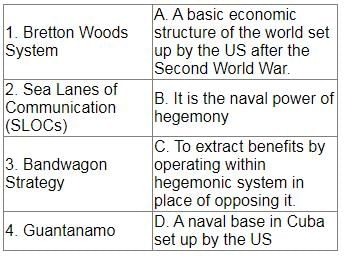Test: Political Economy of IR - UGC NET MCQ
10 Questions MCQ Test - Test: Political Economy of IR
Which of the following organisations said that globalisation is “a shift from a world of distinct national economies to a global economy in which production is internationalised and financial capital flows freely and instantly between countries”?
Match the following pairs and select the correct answer:


| 1 Crore+ students have signed up on EduRev. Have you? Download the App |
Which of the following is best to describe the term 'Globalisation'?
Consider the following statements regarding the South-South Cooperation:
1. It refers to the technical cooperation among developing countries in the Global South.
2. India has been a proponent of it and helped many African nations to prevent the hegemony of developed nations
3. The area of cooperation extends to agricultural development, human rights, urbanization, health and climate change.
Which of the above statements are correct?
With reference to the Group of Seven (G7), consider the following statements:
1. It is an intergovernmental organisation that was formed in 1975.
2. The bloc meets annually to discuss issues of common interest like global economic governance, international security and energy policy.
3. The G7 countries are the UK, Canada, France, Germany, Italy, Japan and the US.
4. The recent meeting of G7 countries was attended by India as a guest country.
Which of the above statement is/are correct?
Consider the following statements regarding Pacific Pumas.
1. It is a political and economic grouping of countries along Latin America's Pacific coast that share common trends of positive growth, stable macroeconomic foundations, improved governance and an openness to global integration.
2. Peru, Cuba and USA forms the part of it.
Which of the statements given above is/are correct?
Which of the following challenges in the global economy can negatively affect the growth in emerging economies like India?
1. Increase in interest rates by the U.S. Federal reserve
2. Uncertainty in Prices of commodities such as crude oil
3. Retreat from globalisation and increasing protectionism.
Select the correct answer using the codes given below.
The agencies of globalisation are:
1. Multinational Corporations (MNCs)
2. Nation–State
3. Media
4. Market
Which of the following events contributed most to the disruption in the Bretton Woods system?

















